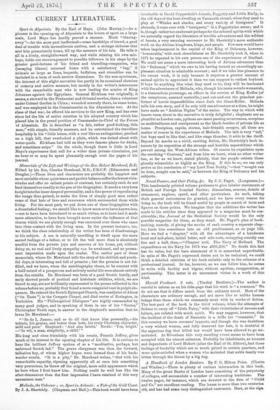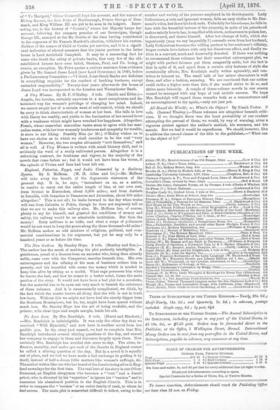A Handbook of London Bankers. By F. G. Hilton Price.
(Chan* and Windus.)—There is plenty of curious information in this book. Many of the great Banks of London have something of the perpetuity of colleges, and accumulate a number of interesting traditions. The twelve pages, for instance, which are devoted to the firm of " Child and Co." are excellent reading. The house is more than two centuries old, and has had some very distinguished customers. Here, at the sign, of "Ye Marigold," Oliver Cromwell kept his account, and the names of Bishop Burnet, the first Duke of Marlborough, Prince George of Den- mark, and King William IIL are yet to be seen in its ledgers. Inter- esting, too, is the history of " Coutts's," where her Majesty keeps her account, following the common practice of our Sovereigns, though George 1II., annoyed at the Mr. Coutts of the time having contributed to the expenses of Sir Francis Burdett's election, withdrew his custom. Neither of the names of Child or Coutts yet survive, and it is a signifi- cant indication of altered manners that the junior partner in the latter house is Lord Archibald Campbell. It may be a reassuring fact for some who doubt the safety of private banks, that very few of the old- established houses have ever failed, Strahan, Paul, and Co. being, of course, an exception. Mr. Price quotes a curious sentence from evidence given by Mr. Samuel Jones Loyd (now Lord Ovorstono) in 1840, before a Parliamentary Committee :—" I think Joint-Stock Banks are deficient in everything requisite for the conduct of banking business, except extended responsibility." Twenty-four years afterwards the house of Jones Loyd was incorporated in the London and Westminster Bank.































 Previous page
Previous page